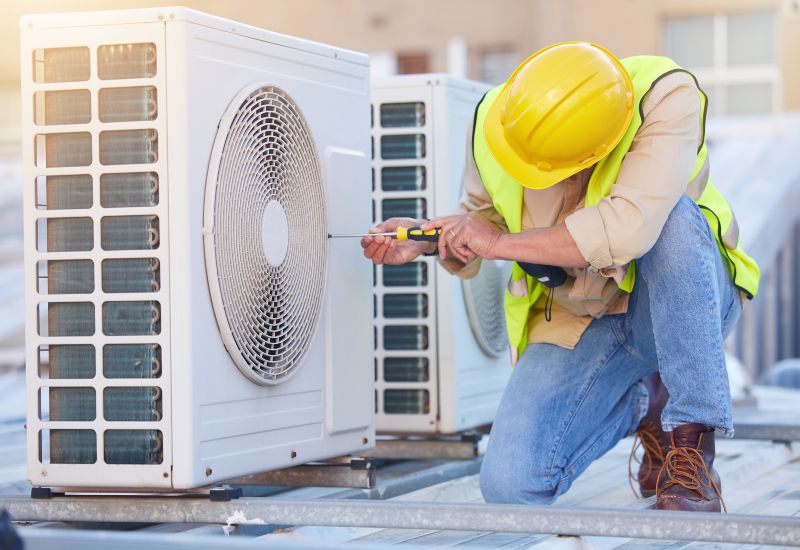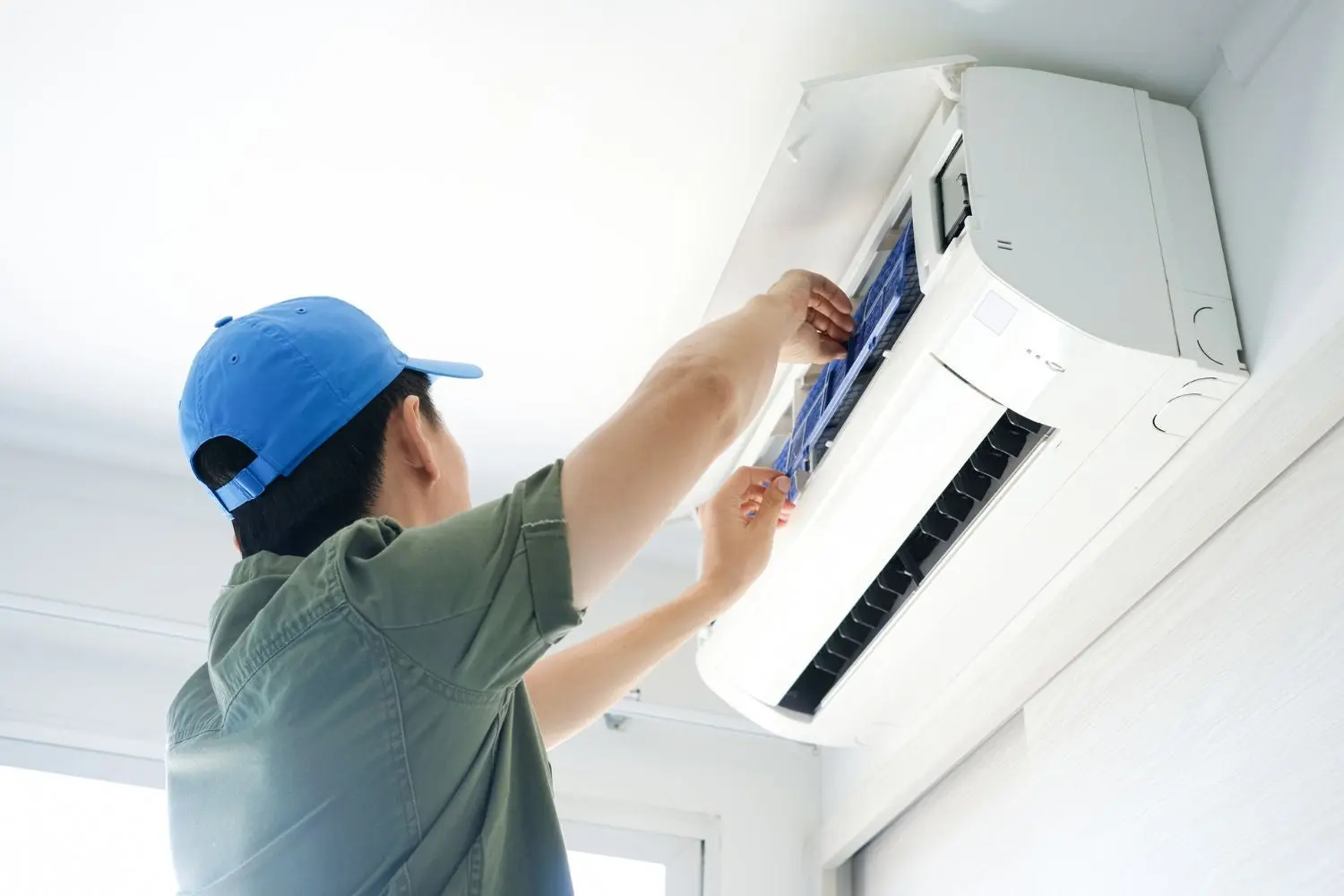Understanding Heating And Cooling Equipments: Important Insights on A/c Units and Their Common Concerns
Understanding a/c systems is crucial for maintaining comfortable interior environments. Air conditioning systems play a substantial function in this, relying upon components like compressors and evaporator coils to function properly. Nonetheless, they are not without problems. From poor air conditioning to uncommon sounds, these issues can interrupt comfort - AC Repair Tampa FL. Recognizing and resolving them very early is critical. What typical challenges do homeowners encounter, and how can they ensure their systems run effectively?
The Essentials of Cooling And Heating Systems
A/c systems, important for preserving indoor convenience, incorporate ventilation, heating, and air conditioning innovations. These systems interact to regulate temperature, air, and humidity high quality within commercial and domestic areas. The home heating part generally entails furnaces or heatpump that create warmth throughout colder months. Air flow ensures the flow of fresh air, reducing interior pollutants and preserving acceptable air high quality levels. This can happen via mechanical means, such as fans, or normally through vents and home windows.

Exactly How Air Conditioning Units Function
Air conditioning devices include several standard components that function with each other to give cooling. Understanding the cooling cycle process is necessary to grasp exactly how these systems keep comfortable indoor temperatures. This section will explore both the crucial elements and the mechanics behind their procedure.
Standard Parts Explained
Cooling systems operate with a collection of basic components that work in consistency to manage indoor temperature levels. The compressor functions as the heart of the system, compressing cooling agent and increasing its pressure. The condenser, generally located outside, dissipates heat from the cooling agent, allowing it to change from a gas to a fluid. The development shutoff then decreases the pressure of the refrigerant, enabling it to cool off prior to entering the evaporator coil. Inside the evaporator coil, the refrigerant takes in warmth from the interior air, properly cooling the space. Lastly, a blower fan circulates the cooled air throughout the environment. Each component plays a necessary duty in guaranteeing effective procedure and suitable convenience within business and household setups.
Cooling Cycle Process
The cooling cycle procedure of an air conditioning device is a thoroughly coordinated series of events designed to eliminate warm from indoor areas. It starts with the evaporator coil, where refrigerant takes in heat from the indoor air, changing it from a liquid to a gas. This gas is after that pressed by the compressor, increasing its temperature and pressure. Next, the hot gas journeys to the condenser coil, where it launches the absorbed warm to the outdoors air, condensing back right into a fluid. The cooling agent then streams to the expansion shutoff, where its stress declines, permitting it to vaporize once again in the evaporator coil. This constant cycle efficiently decreases interior temperatures, keeping a comfy setting.
Common Air Conditioning Issues
Usual air conditioning problems can disrupt the efficiency of Heating and cooling systems when it comes to keeping indoor comfort during hot weather condition. One widespread trouble is inadequate cooling, which may originate from a dirty air filter, obstructed ducts, or cooling agent leaks. Odd sounds such as rattling or buzzing usually suggest mechanical issues that need attention. One more frequent worry is the system's failing to begin, which might be credited to electrical issues or a malfunctioning thermostat. In addition, water leaks around the system can signify clogged up drain lines or a damaged condensate pump, potentially causing water damage. An uncommon rise in power bills might recommend inefficiencies within the system, triggering a need for upkeep. Attending to these common issues quickly can improve the performance and durability of a/c systems, making sure a comfy interior atmosphere during scorching temperature levels.

Repairing Your Ac Unit
Fixing an a/c unit involves identifying typical issues that might occur throughout operation. By following fundamental fixing steps, homeowners can often resolve concerns before seeking specialist help. Recognizing when to call in experts is also necessary for preserving peak efficiency and effectiveness.
Common Ac System Troubles
Air conditioning unit, while important for maintaining convenience in homes and organizations, can come across a variety of problems that interrupt their operation. Common troubles include inadequate air conditioning, where the system stops working to decrease the temperature level effectively, commonly due to a refrigerant leak or a malfunctioning compressor. One more constant concern is uncommon noises, which may indicate worn-out parts or loose components. Airflow issues can occur from clogged up filters or blocked air ducts, resulting in minimized efficiency. In addition, water leakages can happen if the drainpipe line is clogged or if the condensate pump falls short. Lastly, electric issues, such as stumbled breakers or defective circuitry, can result in system closures. Acknowledging these usual issues allows for timely treatments, making certain peak performance.
Basic Troubleshooting Steps
Many property owners may encounter concerns with their cooling systems, yet basic troubleshooting can often solve these issues without the demand for professional treatment. Individuals should examine the thermostat setups to verify it is established to cooling setting and the preferred temperature level. Next off, analyzing the air filter for dirt and clogs is essential, as a tidy filter improves air flow and efficiency. Home owners ought to additionally check the outside system for debris that may obstruct air flow. Furthermore, confirming that breaker are not tripped can stop power problems. Lastly, paying attention for unusual sounds can indicate issues. By adhering to these actions, several usual cooling concerns can be addressed successfully, ensuring a comfortable indoor atmosphere.
When to Call Professionals
Just how can a homeowner identify when it's time to seek expert help for their air conditioning system? Acknowledging the indications of a malfunctioning unit is essential. If the air conditioner fails to cool efficiently, produces strange sounds, or releases undesirable smells, expert intervention may be necessary. Additionally, regular biking on and off or noticeable rises in energy expenses can indicate underlying concerns that call for skilled diagnostics. If they discover noticeable leakages or excessive moisture inside your home, homeowners must also think about calling a service technician. Regular upkeep is crucial, however when issues continue despite basic troubleshooting initiatives, getting an expert is the very best strategy to guarantee security and recover peak efficiency in the air conditioning system.
Essential Maintenance Tips for HVAC Solutions
A/c systems are created for longevity, regular maintenance is vital to ensure their performance and longevity. One important suggestion is to change or tidy air filters each to three months, as blocked filters hinder air movement and reduce efficiency. Furthermore, examining and cleaning the outdoor condenser system aids avoid particles buildup that can block airflow and warmth exchange. Ac Tampa. Guaranteeing that the thermostat is operating correctly is also important, as imprecise readings can lead to unneeded energy consumption
Scheduling seasonal specialist evaluations can identify potential issues early, ensuring peak efficiency. House owners must additionally evaluate ductwork for leakages, which can substantially affect system performance. Ultimately, keeping appropriate insulation around ducts and ensuring adequate air movement can enhance overall system performance. By sticking to these maintenance tips, HVAC systems can operate a lot more properly, offering click for info convenience while reducing energy prices.
The Relevance of Regular Heating And Cooling Inspections
Routine heating and cooling inspections are vital for maintaining system performance and avoiding costly repair work. These evaluations permit skilled professionals to recognize and address possible problems before they rise, making sure that the system operates at peak efficiency. Routine analyses can boost energy effectiveness, causing reduced utility costs and a lower environmental influence.
Regular inspections can prolong the life-span of HVAC systems, as service technicians clean elements, change filters, and inspect for indicators of wear. This aggressive approach decreases the probability of unforeseen breakdowns throughout optimal usage seasons. Furthermore, regular inspections add to improved interior air high quality by making sure that the system is working correctly and efficiently filtering system toxins.
Inevitably, spending in normal heating and cooling inspections fosters a much more comfortable living setting and safeguards against the costs and troubles related to emergency situation repair work. This method is a key part of accountable cooling and heating monitoring, profiting both house owners and commercial home proprietors alike.
Updating Your Heating And Cooling System: When to Consider It
When considering the long-term performance of an a/c system, homeowners and building managers read may at some point deal with the decision to update their devices. A number of variables can influence this option, including age, performance, and power performance. Typically, a cooling and heating system older than 10-15 years might struggle to supply sufficient home heating or air conditioning, causing enhanced energy costs and discomfort.
Furthermore, regular repair services can indicate that an upgrade is essential. If a system requires numerous fixes within a short duration, it might be a lot more economical to purchase a new device.
In addition, improvements in innovation offer more recent systems that are more ecologically friendly and energy-efficient, possibly decreasing operating expense. Home owners should also think about changes in their space requirements, such as including areas or transforming use patterns, which might require a more robust system. Inevitably, identifying these indicators can bring about notified choices concerning cooling and heating upgrades.
Frequently Asked Inquiries
What Is the Average Life Expectancy of a Cooling Unit?
The average lifespan of a cooling system commonly varies from 15 to two decades, depending on aspects such as use, maintenance, and environmental problems. Correct care can prolong this life-span beyond the ordinary span.
Just how much Does It Cost to Fix an A/c System?
The expense to repair an a/c system differs widely, normally ranging from $150 to $1,500, depending upon the issue's complexity, the needed components, and labor costs, influencing total costs for house owners seeking fixings.
What Are the Indications of an Ineffective Air Conditioning System?
Indicators of an inefficient air conditioning unit include irregular air conditioning, raised power costs, unusual noises, frequent biking on and off, and the presence of wetness or frost on the unit. These indicators recommend possible underlying problems calling for focus.
Can I Mount a Cooling Device Myself?
Taking into consideration self-installation of an a/c system, one need to examine their technical skills and knowledge. While it is possible, improper setup may result in inadequacy and potential damages, recommending expert assistance is usually a good idea.
Exactly how Do I Pick the Right Size A/c Unit for My Home?
Choosing the appropriate dimension air conditioner involves calculating the home's square video, considering insulation quality, and evaluating climate variables. Correct sizing assurances efficient cooling, energy financial savings, and excellent convenience throughout the living room.
Heating and cooling systems, vital for keeping indoor convenience, encompass air, home heating, and ventilation conditioning technologies. Air flow guarantees the flow of fresh air, reducing indoor pollutants and maintaining appropriate air quality degrees. Air conditioning, though a separate feature, is indispensable to the A/c system, offering cooling alleviation during warmer durations. When it comes to preserving indoor comfort throughout warm weather, typical air conditioning concerns can disrupt the efficiency of HVAC systems. Several property owners may come across go problems with their air conditioning systems, but fundamental troubleshooting can commonly resolve these problems without the requirement for professional treatment.